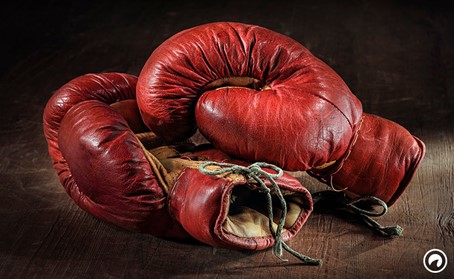How Boxing Gloves Have Changed Throughout History
As you'd probably expect, boxing gloves have a wide and varied history dating as far back as 1500 BC. Humans have fought in hand-to-hand combat since the dawn of time. Whether these early fights were real or for recreational purposes isn't known, but the accompanying boxing gloves have been crafted through generations and provide us with an invaluable insight into the ancient world.
Boxing gloves date back to Ancient Greece in 668 BC. The art of hand-to-hand combat sports such as boxing are a lot older than the gloves themselves, but these offered a solution for the bloody hands that boxers would endure after an Olympic-style fight. The first boxing gloves weren't actually gloves at all. They were more like hand wraps, made out of cheap fabrics. They would be wrapped around the hand and extended back to the wrist to provide extra support.
Knuckle Dusters Not Such a New Invention
In later years, the foundations for what would become the knuckle duster were formed when concrete blocks or metal objects were secured underneath the wraps. These customised boxing gloves were not for the faint of heart. While they inflicted maximum damage to one's opponent, they were also very harmful to the wearer. Ancient Greek accounts tell stories of great fighters with “metal clubs” for hands. These fighters often lost their real hands in matches using the early knuckle duster style gloves. The repeated impact of using such a weapon had catastrophic effects on the bone and cartilage on the hands. In Roman times, these cultivated hand coverings were called Cletus and became popularised throughout the empire, with many differing variations.
The concept of defined rounds did not come into existence until the latter part of the 18th century, which is when boxing betting also took off. The fights that took place prior to this date would have been knockout matches, with no referee and a single finger gesture to signal defeat. While Ancient Greece is credited with inventing the earliest forms of boxing gloves, Asia and the Middle East also developed strong forms of fighting styles akin to boxing. The famed ancient Muay Thai fighting style in Thailand dates back to the Han dynasty, when Thai soldiers fought off an invasion from the Chinese. The soldiers of Siam, as Thailand was once called, were trained in two-sword combat. This ancient form of Muay Thai combat allowed its soldiers to fight swordless. The loss of a sword meant that they were able to use their hands, legs, knees, and elbows to continue fighting.
Jack Broughton’s Contribution
Boxing really took off during the eighteenth century where is precursor bare-knuckle fighting was seen as a poor man's sport. The leather boxing glove as we know it today wasn't introduced until 1773, when Jack Broughton invented it. Broughton takes his place in history as the father of boxing, although his gloves wouldn’t be used in the ring until many years later. They were however used in training sessions and sparring until their use was finally recognised. It's interesting to note that boxing gloves were colloquially known as “mufflers” due to the relative lack of sound a landed punch makes when compared to bare knuckles.
Initially, boxing gloves were seen as effeminate objects and signalled weak opponents. It wasn't until the middle classes started to partake in the sport that the humble boxing glove finally took off. Esteemed gentlemen and those from the upper echelons of society didn't want to sustain the injuries associated with boxing, thus making Broughton's gloves an overnight hit.
The introduction of a set of rules to mandate boxing came into effect in London in 1865. The Marquess of Queensbury Rules set out for the first time the requirement to wear a form of padded glove. This was a welcome change for boxing athletes, who had until now been forced to fight bare-knuckle at the behest of the London Prize Ring Rules, which advocated for no padding of the fists. Without the Queensbury Rules, modern-day boxing may not exist as we know it. The reforms were a much-needed addition to a sport that has become over masculated in recent years.
New Weight Requirements
Padding such as horsehair and cotton were added to give boxing gloves the much-needed weight required for the full-contact sport. The minimum proposed weight by this point was upwards of 5 oz. This meant that for the first time, boxers were fully padded and protected from severe facial injuries that they would otherwise have had no choice but to incur. The biggest change occurred in the 1960s when the internal padding was switched from horsehair to foam. The foam enabled the evolution of a much smaller and compact glove that offered the same levels of protection for the hands and face.
The United States Boxing Federation states that a professional boxing match must happen within a ring by opponents wearing gloves no lighter than 8-10 oz. This is a far cry from what boxing was like during the latter part of the eighteenth century. The rules are firmly in place to protect the participants of the sport and the humble boxing glove has, and is, playing a significant role in the future development of boxing.

